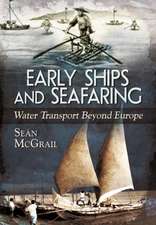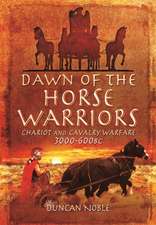Alexander the Great Failure: The Collapse of the Macedonian Empire
Autor Dr John D Graingeren Limba Engleză Paperback – 10 iun 2009
Alexander the Great's empire stretched across three continents and his achievements changed the nature of the ancient world. But for all his military prowess and success as a conqueror, John Grainger argues that he was one of history's great failures. Alexander's arrogance was largely responsible for his own premature death; and he was personally culpable for the failure of his imperial enterprise. For Alexander was king of a society where the ruler was absolutely central to the well-being of society as a whole. When the king failed, the Macedonian kingdom imploded, something which had happened every generation for two centuries before him and happened again when he died. For the good of his people, Alexander needed an adult successor, but he refused to provide one while also killing any man who could be seen as one. The consequence was fifty years of warfare after his death and the destruction of his empire.
The work of Philip II, Alexander's father, in extending and developing the kingdom of the Macedonians was the foundation for Alexander's career of conquest. Philip's murder in 336 BC brought Alexander to the kingship in the first undisputed royal succession on record. Alexander's campaigns achieved unparalleled success and the young king of Macedonia, leader of the Greeks, Pharaoh of Egypt, became Great King of Persia at the age of twenty-five.
| Toate formatele și edițiile | Preț | Express |
|---|---|---|
| Paperback (1) | 122.48 lei 6-8 săpt. | |
| Bloomsbury Publishing – 10 iun 2009 | 122.48 lei 6-8 săpt. | |
| Hardback (1) | 487.96 lei 6-8 săpt. | |
| Bloomsbury Publishing – 30 noi 2007 | 487.96 lei 6-8 săpt. |
Preț: 122.48 lei
Preț vechi: 212.33 lei
-42% Nou
Puncte Express: 184
Preț estimativ în valută:
23.44€ • 25.45$ • 19.69£
23.44€ • 25.45$ • 19.69£
Carte tipărită la comandă
Livrare economică 23 aprilie-07 mai
Preluare comenzi: 021 569.72.76
Specificații
ISBN-13: 9780826443946
ISBN-10: 082644394X
Pagini: 256
Dimensiuni: 156 x 234 x 15 mm
Greutate: 0.4 kg
Editura: Bloomsbury Publishing
Colecția Continuum
Locul publicării:London, United Kingdom
ISBN-10: 082644394X
Pagini: 256
Dimensiuni: 156 x 234 x 15 mm
Greutate: 0.4 kg
Editura: Bloomsbury Publishing
Colecția Continuum
Locul publicării:London, United Kingdom
Caracteristici
This is more than just a biography of Alexander the Great â?" it investigates his origins and what happened to the empire after his death.
Cuprins
Introduction
1: Macedon 370 - 359 BC - A Failing State
World View 1: 360 BC
2: Security of Macedon 359 - 354 BC
3: Defence of the Kingdom 354 - 346 BC
4: Cold War 346 - 340 BC
5: Conquest of Greece 340 - 334 BC
6: The Great Campaign 334 - 325 BC
7: The United Empire 325 - 319 BC
World View 2: 319 BC
8: Antigonos the One-Eyed 319 - 311 BC
9: The New King 311 - 306 BC
10: Antigonos' Failure 306 - 298 BC
11: New Kings for Macedon 298 - 291 BC
12: King Demetrios and his Enemies 291 - 285 BC
13: Last Chance for the Empire 285 - 281 BC
14: The New Kings, and Disaster 281 - 277 BC
15: The New World 277 - 272 BC
World View 3: 272 BC
Conclusion
1: Macedon 370 - 359 BC - A Failing State
World View 1: 360 BC
2: Security of Macedon 359 - 354 BC
3: Defence of the Kingdom 354 - 346 BC
4: Cold War 346 - 340 BC
5: Conquest of Greece 340 - 334 BC
6: The Great Campaign 334 - 325 BC
7: The United Empire 325 - 319 BC
World View 2: 319 BC
8: Antigonos the One-Eyed 319 - 311 BC
9: The New King 311 - 306 BC
10: Antigonos' Failure 306 - 298 BC
11: New Kings for Macedon 298 - 291 BC
12: King Demetrios and his Enemies 291 - 285 BC
13: Last Chance for the Empire 285 - 281 BC
14: The New Kings, and Disaster 281 - 277 BC
15: The New World 277 - 272 BC
World View 3: 272 BC
Conclusion
Recenzii
"The kingdom of Macedon had existed since the seventh century BCE, writes military historian Grainger in his swift, certain summary. Claiming its mythic descent from a relative of Heracles, speaking a Greek dialect and surrounded by other important city-states such as Chalkidike and Thessaly, Macedon was overshadowed by the mighty Persian Empire...Grainger tracks the long series of succession crises that ended with the ascent in 359 BCE of educated, opportunistic Philip II, who quickly killed off all rivals and instituted a series of innovations that would render Macedon powerful and rich. He instilled new discipline among cavalrymen, introduced the sarissa, a longer infantry spear, and deployed cunning, effective diplomacy. Philip's murder in 336 brought to the throne his 20-year-old son, Alexander, who immediately embarked on a nine-year campaign to subjugate his neighbors and the Persian Empire. The administration of his conquests was left to ineffectual satraps, and with the death of their charismatic leader in 323, in the absence of a designated heir, the army fell in disarray. Power was seized by Perdikkas, then Antipater, then Antigonos, who declared himself the legitimate successor of Alexander after the decisive battle of Salamis in 306. He was followed by a disastrous series of kinds and the invasion of the Galatians in 279 BCE. Macedonian unity was never again achieved, Grainger asserts, because, 'Alexander's ambition was too great for his people.' Written from the point of view of those subjugated by the Macedonian empire over two centuries, this book offers a unique and significant take on well-worn history." --Kirkus
This unconventional and provocative analysis presents Alexander the Great as anything but. The Macedonian conquest was widely detested and resisted in a Persian Empire military historian Grainger describes not as the discordant mélange of peoples depicted in classical Greek accounts, but as the political and economic center of the civilized world. A hubristic dream of world conquest led Alexander to neglect the empire he ruled. He ignored his health to the point of contributing to his early death. He failed to provide an heir, refused to designate an adult successor and eliminated aspirants to that role. His inability to delegate work or responsibility crippled his administrative system. Macedonia was Alexander's fulcrum, but his wars left it so weakened that on his death the kingdom imploded and devoted what energy remained to compounding chaos in Greece. Egypt reasserted its independence and its boundaries. The Seleucid kingdom (founded by Seleukos Nikator, one of Alexander's lesser subordinates) eventually extended from Anatolia to northern India. Seleukos came closest to securing Alexander's imperial heritage. Even before Seleukos's assassination, however, his domain proved difficult to control without the military resources Macedonia had provided Alexander. Alexander's life and conquests may have been extraordinary, but their result was a failed empire whose collapse facilitated the rise of the Roman Republic. (Feb.) --Publishers Weekly
"Alexander the Great Failure: The Collapse of the Macedonian Empire examines the rise and fall of an empire which rested on the king's absolute authority: when the king failed his empire crumbled. Alexander needed an adult successor, but refused to provide one and even killed potential candidates for the job: the foundations of his empire and their shaky grounds are analyzed here in an outstanding in-depth survey recommended for college-level collections strong in early history." - Diane C. Donovan, Midwest Book Review, January 2008
"Grainger portrays Alexander as the Hellenic version of Genghis Khan, shredding through the delicate fabric of civilization." Reviewed by Alexander Nazaryan in The New Criterion, 2008
Mention in Bryn Mawr Reviews 30 September 2008
The author's puzzling thesis is stated in his book's title: Grainger believes that Alexander the Great was a failure...Grainger's failure to be persuasive in his thesis is compounded by careless book production: misprints, confused chronology, incomprehensible maps, and an inconsistent rendering of foreign personal and place-names into English. Better books about Alexander are available. Summing Up: Not recommended. - E. N. Borza, CHOICE, January 2009
This unconventional and provocative analysis presents Alexander the Great as anything but. The Macedonian conquest was widely detested and resisted in a Persian Empire military historian Grainger describes not as the discordant mélange of peoples depicted in classical Greek accounts, but as the political and economic center of the civilized world. A hubristic dream of world conquest led Alexander to neglect the empire he ruled. He ignored his health to the point of contributing to his early death. He failed to provide an heir, refused to designate an adult successor and eliminated aspirants to that role. His inability to delegate work or responsibility crippled his administrative system. Macedonia was Alexander's fulcrum, but his wars left it so weakened that on his death the kingdom imploded and devoted what energy remained to compounding chaos in Greece. Egypt reasserted its independence and its boundaries. The Seleucid kingdom (founded by Seleukos Nikator, one of Alexander's lesser subordinates) eventually extended from Anatolia to northern India. Seleukos came closest to securing Alexander's imperial heritage. Even before Seleukos's assassination, however, his domain proved difficult to control without the military resources Macedonia had provided Alexander. Alexander's life and conquests may have been extraordinary, but their result was a failed empire whose collapse facilitated the rise of the Roman Republic. (Feb.) --Publishers Weekly
"Alexander the Great Failure: The Collapse of the Macedonian Empire examines the rise and fall of an empire which rested on the king's absolute authority: when the king failed his empire crumbled. Alexander needed an adult successor, but refused to provide one and even killed potential candidates for the job: the foundations of his empire and their shaky grounds are analyzed here in an outstanding in-depth survey recommended for college-level collections strong in early history." - Diane C. Donovan, Midwest Book Review, January 2008
"Grainger portrays Alexander as the Hellenic version of Genghis Khan, shredding through the delicate fabric of civilization." Reviewed by Alexander Nazaryan in The New Criterion, 2008
Mention in Bryn Mawr Reviews 30 September 2008
The author's puzzling thesis is stated in his book's title: Grainger believes that Alexander the Great was a failure...Grainger's failure to be persuasive in his thesis is compounded by careless book production: misprints, confused chronology, incomprehensible maps, and an inconsistent rendering of foreign personal and place-names into English. Better books about Alexander are available. Summing Up: Not recommended. - E. N. Borza, CHOICE, January 2009
Descriere
Descriere de la o altă ediție sau format:
Alexander the Great's empire stretched across three continents and his achievements changed the nature of the ancient world. This book argues that he was one of history's great failures.
Alexander the Great's empire stretched across three continents and his achievements changed the nature of the ancient world. This book argues that he was one of history's great failures.











